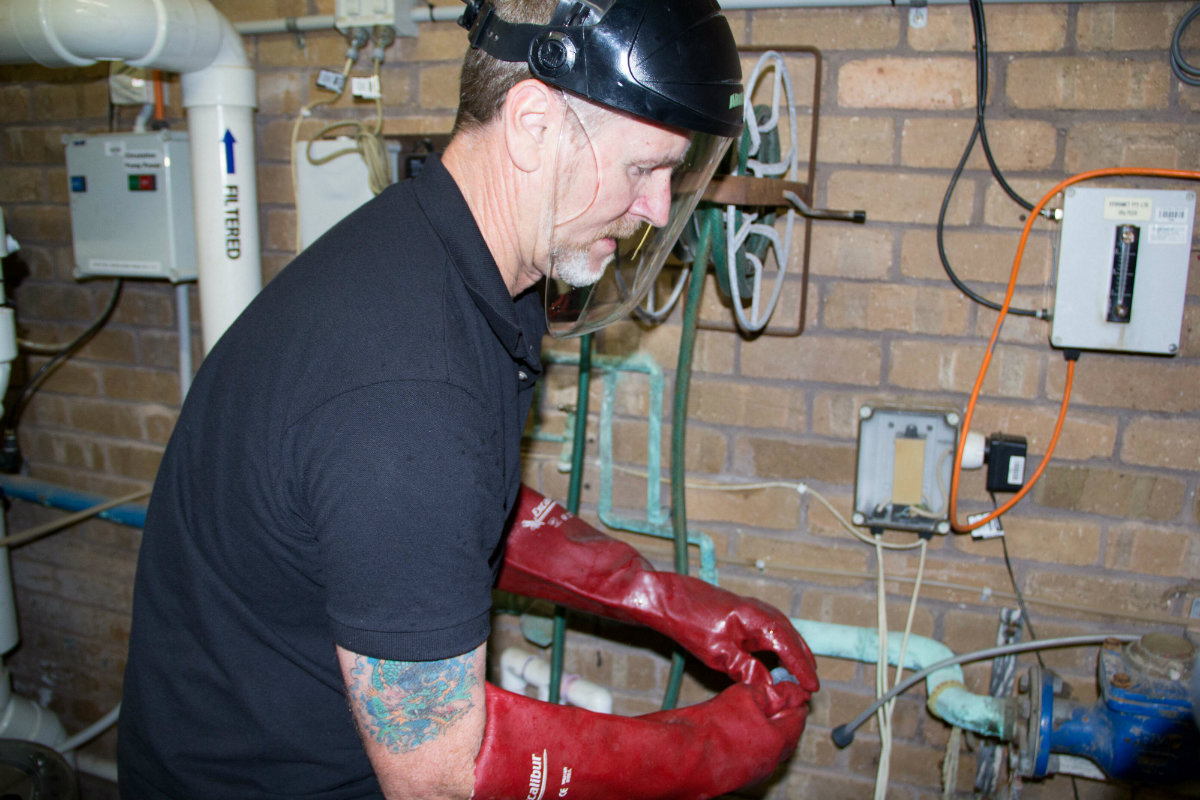For the service professional, the workplace is the homeowner’s backyard, the distribution center and — most treacherous of all — the road. All sorts of perils and pitfalls await, from vehicular accidents, chemical spills, slips, falls and electric shock. Here, we examine how to prevent these from occurring and what employees should do if the worst happens.
IMPLEMENT A PLAN
It’s the employer’s responsibility to provide a comprehensive workplace safety program. This should include periodic reviews of company polices for chemical handling, driving, personal protective equipment and other safety issues.
Trevor Sherwood kicks off every season with an event he calls “OSHA Day.” The owner of Pool Operation Management in Brick, N.J. gathers all his service technicians for a round table discussion of OSHA regulations and how they apply to the company’s work. His insurance company provided an instructor for the educational session free of charge.
Not only does this help keep safety top of mind, but it also safeguards him from lawsuits. That’s why he stresses the importance of documenting who attended and topics covered. Each employee signs a document acknowledging that they reviewed and understood the materials. These are kept on file.
As an expert witness, Sherwood has seen the consequences of other businesses failing keep adequate records. “You’ve got to document,” says Sherwood, who also helped develop the National Swimming Pool Foundation’s new Advanced Service Technician course, which includes safety curriculum. “If you go to court and it’s not on paper, it never happened.”
But a safety program is worthless if it’s not enforced. Business owners can motivate employees to follow the rules with either a carrot or a stick.
“I personally think a disciplinary policy is important because it helps set the tone,” says Justin Francini, risk control consultant for CNA Insurance in Glastonbury, Conn. and a business liaison for the Northeast Spa & Pool Association.
Taking punitive action would go something like this: For the first violation, give a verbal warning. On the second offense, issue a formal written warning. Third strike? Consider a suspension. A fourth incident could result in termination.
Managers wishing to incentivize safe practices should exercise caution, OSHA says, because some programs may discourage employees from reporting accidents. If you want to reward your crew, do it to reinforce positive acts, such as when two workers prevent back strain because they loaded a truck with 50-pound bags of salt together. That approach is better than offering gift cards or a pizza party for going 30 days accident-free.
“The important thing is to leave injuries out of the mix to stay within OSHA’s request,” Francinci says.
GETTING TO KNOW OSHA
Service technicians owe it to themselves to scrutinize OSHA regulations, which can apply to businesses in surprising ways.
Many service professionals, for example, might not know that fall protection is required for all leading edges with 6-foot drop-offs or greater. That means if you’ve ever acid-washed a pool without some sort of barrier around the perimeter, you’ve violated OSHA’s rule.
“The reality is, most pool companies don’t have a formal plan for that,” says David Blossom, senior loss control consultant for Amerisure in Tampa, Fla.
Fortunately, a fall-protection plan doesn’t have to be complicated. Orange cones and caution tape, or portable guard rails, could suffice. Also, be sure to keep tools and supplies at least 6 feet from the pool’s edge.
That might sound like safety overkill, but it’s the law. And, hey, accidents have been known to happen.
-
OSHA’s Ouches : A List of Trips, Slips and Shocks
The Occupational Safety and Health Administration maintains a detailed log of reported injuries. Here are six reports involving pools

OSHA regulations also clearly spell out how to handle materials such as chemicals. Safety Data Sheets are critical to understanding the dangers associated with acid, chlorine and other water-treatment products. They also outline the proper personal protective equipment that a tech should wear.
YOUR VEHICLE POLICY
Property damage, injuries, fatalities, HAZMAT response — your greatest area of exposure comes from vehicles and the employees who drive them.
That’s why Sherwood recently had his crew participate in a defensive driving course. This, too, was arranged by his insurance provider, free of charge. Not only does this allow technicians to review how to handle a vehicle hauling 600- to 1,000 lbs. of supplies — a skill that can go dormant over the winter — but it can help reduce points on a driver’s license.
“That way, if they get a ticket over the season, their license isn’t taken away,” Sherwood says.
It’s also an opportune time to go over the company’s personal-use policy and what to do in the event of an accident.
-
OSHA’s Ouches : A List of Trips, Slips and Shocks
The Occupational Safety and Health Administration maintains a detailed log of reported injuries. Here are six reports involving pools

You do have a personal-use policy, right? A good one doesn’t allow employees to use the company truck for anything outside work. Blossom recalled an incident involving a pool service tech who got into a collision while on vacation. He was, of course, driving the company truck at the time. The owner of the company tried to classify it as misuse of a company vehicle, but there was no such policy on paper. The lesson: Get those policies in writing.
There are a couple ways to encourage extra caution behind the wheel. Money serves as a great motivator. For this reason, Blossom recommends applying a $500 to $5,000 insurance deductible — and making the driver pay it if he or she is found at fault.
Technology, too, can modify behavior. Fleet-management software can alert business owners when employees do anything risky on the road, such as driving fast, braking hard, or not using blinkers and seat belts.
And to curb distractions, risk-control experts recommend that employees put their phones on driving mode. This limits notifications that appear on the phone’s screen from texts, calls and other alerts. This feature can even send automatic replies when someone tries to call.
Any discussion surrounding proper use of company vehicles also should include a thorough overview of Department of Transportation regulations regarding chemical cargo. Each state has different rules, but all place weight limits and stipulate container requirements. For instance, containers should be securely fastened.
-
OSHA’s Ouches : A List of Trips, Slips and Shocks
The Occupational Safety and Health Administration maintains a detailed log of reported injuries. Here are six reports involving pools

The most effective fleet-safety programs actually weed out bad drivers before they can be hired. All applicants should be subject to a motor-vehicle records check, Francini advises.
Ultimately, service firms must exercise every precaution to protect their most valuable assets: Their employees.
“It’s important for owners to take the initiative and hold employees accountable,” says Vincent Niglio, commercial insurance adviser with Brown & Brown Insurance, in Leesburg, Fla. “At the end of the day, it’s their name on the truck and their reputation on the line.”




